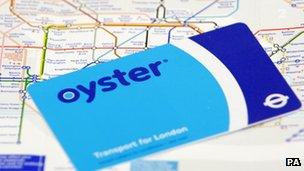London transport fares 2014: Prices frozen 'in real terms'
- Published
Some Tube season ticketholders will see a rise of 1% above inflation
Most transport fares in London are to rise by the rate of inflation, it has been announced.
The average fare will rise by 3.1%, the retail price index rate which mayor Boris Johnson said was a "freeze in real terms".
But prices for season tickets on travelcards will go up by 4.1%. Most pay-as-you-go Tube fares will not rise.
On buses and trams, PAYG single fare will rise by 5p to £1.45 and seven-day travelcards go up by 4.1%, to £20.40.
But both the daily price cap and the £2.40 cash fare for a single bus journey will be frozen.
Peak and off-peak single fares on the Tube, DLR and Overground Zone 1 and off-peak single Zone 1-2 will rise by 10p, while cash fares will increase by 20p.
One-day fare caps on Oyster and contactless cards will be unchanged, which Transport for London said would benefit about 200,000 people a week.
Fares on the Emirates Air Line cable car will also increase by 10p except for multi-trip PAYG fares which will remain at £1.60.
TfL has withdrawn all off-peak One Day Travelcards, and only Zones 1-6 cards will be available from 2014.
All free and concessionary fares for young, elderly and disabled people have been protected.
'Real pressure'
The Conservative mayor said: "This package, which has been made possible by the continuing delivery of efficiencies across TfL, ensures that fares remain affordable and that we have the level of funding we need to continue to improve the network and deliver even better, more frequent services for everyone.
"I know that families and working Londoners who have helped to drive the economic recovery still face real pressure over the cost of living and so I've decided to keep fares in line with RPI and therefore freeze them in real terms for next year."
Val Shawcross, Labour transport spokeswoman for London Assembly Group, said the real time freeze provided "limited relief".
"We have had five years of inflation busting fare rises under Boris, with bus fares up 55% and Tube fares up 30%.
"It's disappointing that he hasn't rolled out this real term freeze across all pay as you go and travel card fares, as some Londoners will be hit with yet another inflation busting fare rise."
Caroline Pidgeon, leader of the Liberal Democrat London Assembly Group, said: "If the mayor stopped wasting so much money on his vanity transport projects such as the Thames Cable Car and the ridiculously expensive new bus for London he could easily fund a one-hour bus ticket, cheaper 'early bird fares' and a part-time travelcard."
Bob Crow, general secretary of the Rail, Maritime and Transport union, said the fares would "still hit London's poorest the hardest".
"The cynical attempt to play off fares against cuts to jobs, services and safety will fool no-one as this highly politicised stunt unravels for Boris Johnson and the government," he said.

Most pay-as-you-go fares on the Tube, DLR and Overground will not go up
Transport for London said it would also detail how it was making £16bn of efficiencies and savings across the network in its business plan to 2020/21, to be released on Wednesday.
A spokesman said TfL had already secured more than half of its savings.
The service has an annual turnover of £9bn, with £4-5bn coming in fares revenue.
The Conservative Party on the London Assembly said by "further addressing waste and improving efficiency across the organisation, TfL could continue to freeze fares at inflation in future years".
The Green Party on the assembly said: "The mayor should be reducing fares and shifting the burden away from public transport users and towards the motorist."
- Published30 October 2013
- Published12 September 2013
- Published26 June 2013